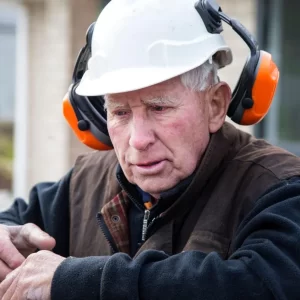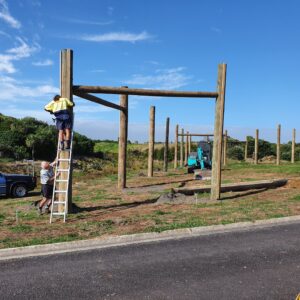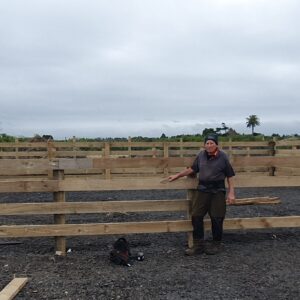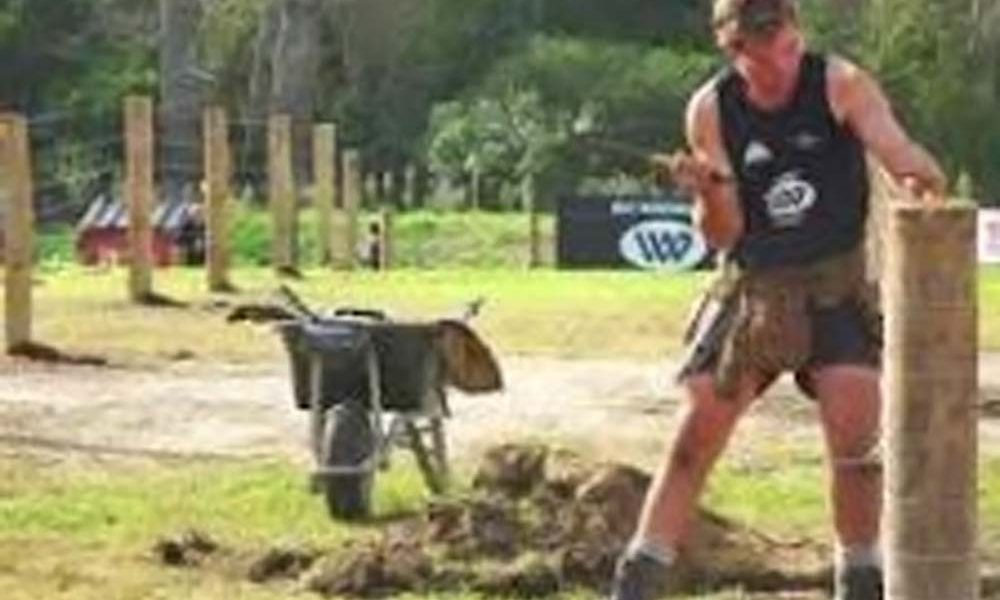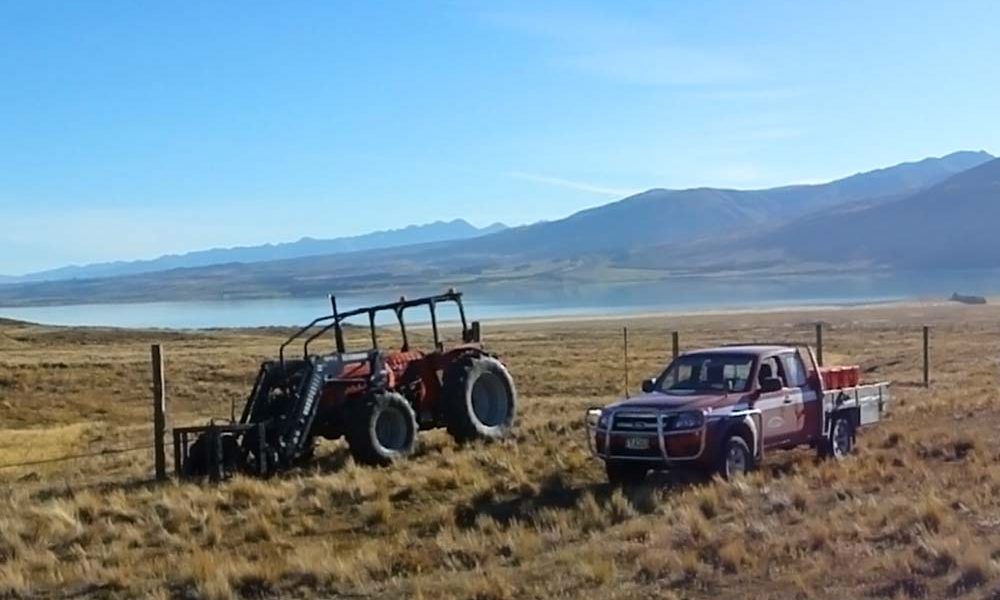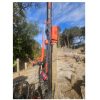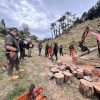
Fencing Contractor Joe Corlett has seen a lot over his 83 years. Coming from the school of hard knocks, Joe is a tough bugger who has seen more than his fair share of challenges. He shares his life story with Alice Scott.
Despite some major hurdles in his life, Taranaki fencing contractor Joe Corlett’s philosophy has always been about giving people a second chance, and he has had a lasting impact on the lives of many. Generous, effervescent and extremely hard working, Joe maintains that a job should be done once and should be done well.
Joe was born in 1941. One of 10 children, he was the oldest boy and recalls working as a youngster on his father’s large sheep and beef farm in the Taranaki.
“Dad was a very cruel man. For some reason, he took issue with me and would beat me. I came home from school one day when I was 14, and he told me I was finishing school and staying home to work on the farm, so that’s what I did.”
Those years are not fond ones for Joe as he endured harsh treatment by his father. “I had a lot of siblings, but he directed most of his abuse at me. I know he was violent towards my mother sometimes too.” After a harsh beating from a stock whip at the age of 17, Joe decided he had had enough. His father had disappeared after the whipping only to return with a knife announcing he would kill him.
“I had to get out of there. I left on foot and walked about eight miles to my uncle and aunt’s house. They took me in, and we became very close. I don’t know why my father was so cruel. He went to his grave as a horrible, nasty man,” he said.
During his time at home, Joe had learnt to shear and spent his early twenties working for shearing contractors while also working for his uncle who was a dairy farmer.
Joe then worked for a contractor called Monty Simons and was looking to purchase some machinery from Monty and go into contracting himself. “My father got wind of it and said to Monty if he ever sold any gear to me, then Monty would never get another contract on my father’s property again. He really had it in for me, even when I was an adult.”
Joe’s mother was a very kind and loving woman, but powerless against his father. “She died at the age of 53 from a blood clot. I think it came from a bad injury she got when Dad kicked her in the leg one time.
“It was very sad when mum died, she didn’t get to see us all grow up and enjoy our adult lives or meet any of our boyfriends and girlfriends. She made all our clothes when we were little, how she did it all I have no idea.”
After working for Monty, Joe moved on to a dairy farm in Lepperton. The skills he had picked up from his time with Monty were invaluable, and he did a bit of everything from cultivating, drain laying and fencing. “I did a lot of fencing work there, there were always fences to pull down and new fence lines to build.”
1976 was a challenging year for Joe – the boss’s son had returned home and was making life harder for him, and his first wife had also had an affair and left him. “I had to pick myself up and move on”.
He started a fencing contracting business in Lepperton. “I went along to a fencing workshop day organised by the Young Farmers Club and that was where I met a man called Bill Schuler. He was a master fencer, and we got on well. I worked with him a lot after that.”
Joe had been fencing a couple of years when drought hit and the fencing work dried up. “There was a gas pipeline being installed from New Plymouth to Te Kuiti, and I got a good name for myself doing that work. I picked up a lot of knowledge about drain laying and earth movement.”
Joe recollects with ease the many jobs he has been on over the years; some were decades ago and he recalls them and the people he worked alongside like it was yesterday. Several interesting and highly specialised fencing jobs stand out, such as fencing the perimeter of a golf driving range in Papakura. The posts were 14 metres high with conventional three metre stay blocks. “That was a very enjoyable and interesting job.”
Another contract was installing an electrified fence for a snail farm. “There were 12 electric wires threaded through cloth and netting on an angle with aluminium springs to keep the rats out.”
Another job was assembling a Kiwifruit block. “Once we had built the vine structure, we flew the protective cloth across with a helicopter to avoid catching it on things. It hadn’t been done before and it worked well. Often, it’s been about thinking outside the square and not being afraid to try new things,” he said.
Joe also likes to draft his own fencing designs; he has an eye for seeing what will work and what won’t. “I recall a job I was asked to do, building a specialised fence for a flower bulb farm. We got to the site, and I looked at the drawings they had an engineer design, and I knew the fence wouldn’t work. We could’ve just got on with it, built it anyway and sent them the bill, but I knew I couldn’t stand by it as it wouldn’t have lasted. So, we turned around and went home. Two years later the landowner came back and asked me to come up with something that would last the distance, so I drafted up a design and away we went.”
The fence was 75 metres long and 45 metres wide; more than 3000 square metres of area, suspended with no internal poles. “It was a challenging and satisfying build which has gone the distance.”
While it is the workmanship of a fence line that Joe gets great satisfaction from, working with good people and finding quality staff has also been a highlight for what is almost 50 years of contracting. One of the first employees he took on was Paul Van Beers. “I recall getting a call from this young fella who was looking for a job. He had been working for a farmer called Bob Whiteside. Bob told Paul to call me. I knew anyone that had been working for Bob was worth giving a chance.”
These days Paul is a household name in the fencing industry, having won the Golden Pliers 13 times and the Fieldays Silver Spades 14 times. “Paul was a natural from the start. Everything he did was impeccable.” Joe stops short of crediting his own training skills for how Paul turned out, but it’s clear Joe has a high standard of workmanship and finish for everything he does.
“It’s in the detail; keeping it tidy, keeping the fence out of the water. If that means you need to dig a bit of a ditch to make sure the water runs away from the fence line, then so be it.”
In the 1980s, Joe became known to many as ‘Railway Joe’. He was infuriated one day when he saw the state of the wire coils that had been delivered to a retailer via rail, and he took it upon himself to do something about it. “The rail company wasn’t taking any care when they were loading it into the carriages, they were just throwing it all in and then loading other stuff on top. It would get all buggered up on the journey and would be a prick of a thing to pull out when doing a line. The big boss wasn’t interested in a call from me, so I thought ‘bugger you, I will make it your problem alright’.”
Joe found out when the next delivery was due to be delivered to the retailer. “When it arrived, sure enough, it was more of the same and we just loaded it all back up on a truck and sent it back to the rail yard where it had come from. They had all these buggered coils of wire that no one wanted. He was keen to talk to me after that.” Joe’s efforts changed the way fencing gear is now packaged and transported around New Zealand.
Coming from a tough upbringing, Joe agrees he may have grit and sheer bloody mindedness in the face of adversity, but he is also a very sensitive person and feels empathy for others. Treating others with care and respect is important and he was heavily involved in the build of the Taranaki Retreat; a place where those going through a hard time can go to find peace and support. Ten years prior, Joe’s second wife had taken her own life, “it took me a very long time to understand why. Helping build the retreat gave me a deeper appreciation, life is just so precious,” he said.
“The retreat never got a bill from me. When it came to the opening, they thanked me and made a big deal out of me. I went home and burst into tears, I had never had that kind of praise growing up and it absolutely knocked me for six,” he said. Telling someone they matter is important to Joe, and he makes a point of doing that with the good young employees he hires, some of them have come from a rough background, and Joe has been happy to take them on and give them a second chance at life. “Most of the time it has worked out, and they move on a better person after learning a thing or two from this old bugger,” he said.
Banter and enjoyment in his work is an important element to the day. “You’ve got to be able to have a laugh and enjoy each other’s company. It’s about teamwork, looking out for each other,” he said.
When WIRED magazine caught up with Joe, he was busy supervising a technical job next door to the Taranaki Airport. “I will see this job out and then after that I will call it a day.” Just what is next he isn’t quite sure exactly, he is due to get shoulder surgery, but he knows he won’t be hanging up his boots completely. “I will help train young people, and I will go annoy the odd bugger or two and have a cup of tea with them. There’s always something to do, isn’t there?”
Written by Alice Scott
Published in WIRED issue 74/September 2024 by Fencing Contractors Association NZ
Read WIRED online
Follow us on Facebook
© Fencing Contractors Association NZ (FCANZ)

